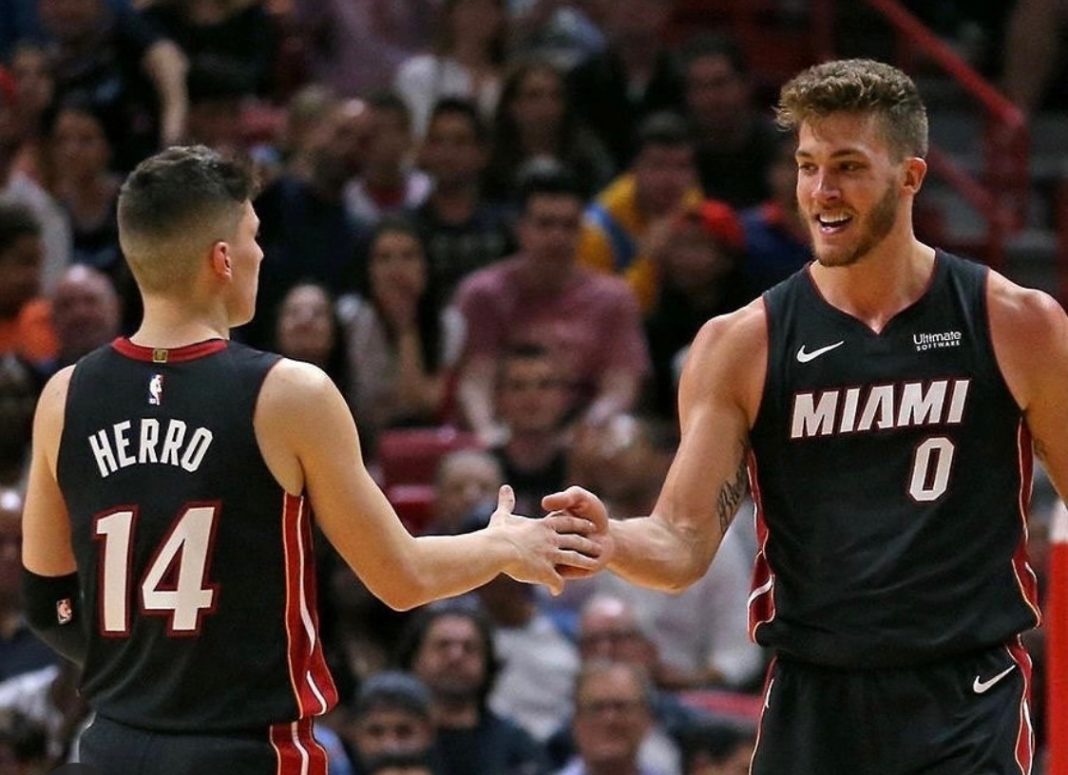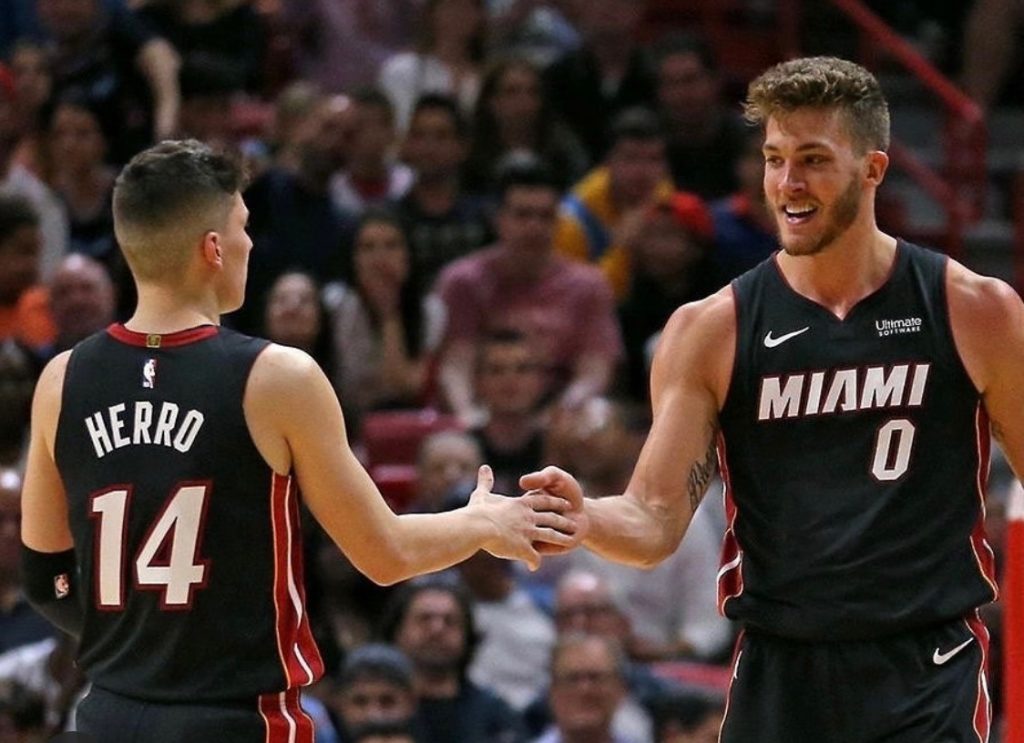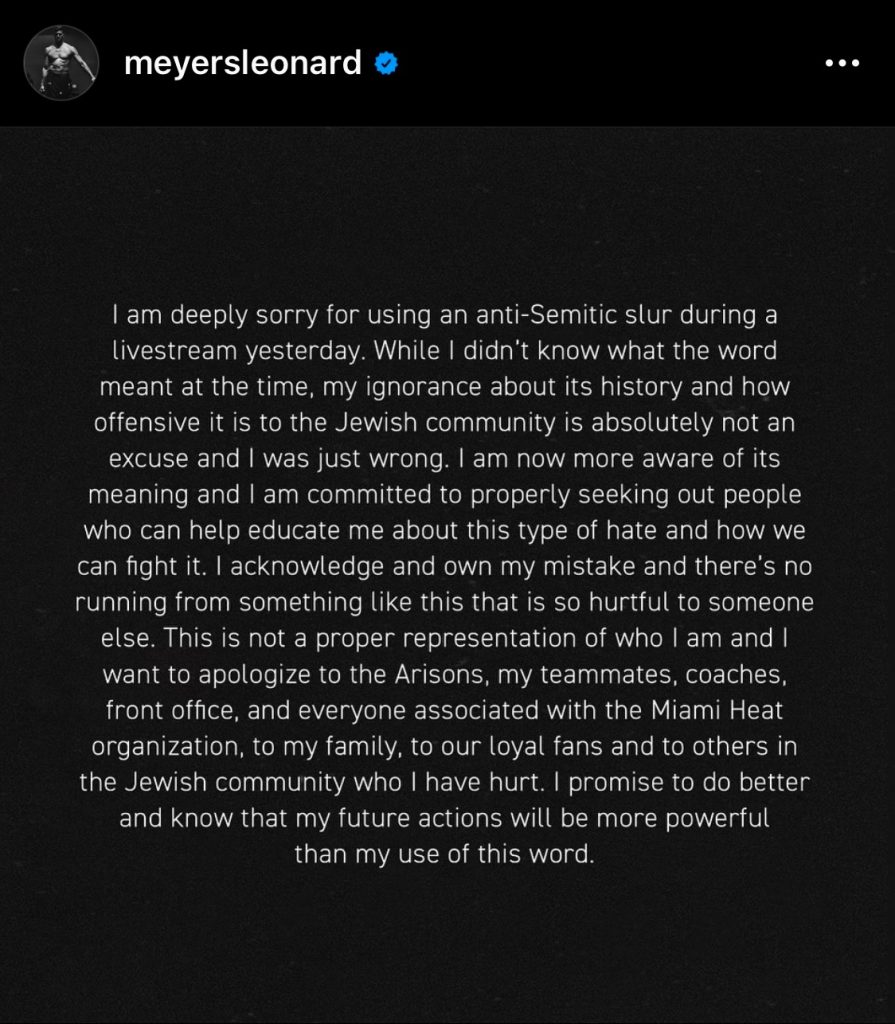

In the age of the internet, one second can change a person’s life. Few know that more now than Meyers Leonard.
On April 13, Leonard — the embattled NBA free agent and former Heat player — met with University of Miami students at an event hosted by UM’s Hillel called From HEAT to Healing.
As he tells it, Leonard was living a “dream” and was “incredibly blessed” to be doing what millions dream of and only about 500 people get to do for a living, playing in the NBA. That was, until one word changed his life.
On March 9, then a backup center for the Miami Heat, Leonard was playing “Call of Duty: Warzone,” a popular first-person shooter game, on Twitch, where he was heard saying an anti-Semitic slur. The video quickly went viral. The Heat soon released a statement saying he was “away from the team indefinitely.”
Meyers Leonard says racial slurs while playing CoD pic.twitter.com/WHwUnbV0pR
— Main Team (@MainTeamSports) March 9, 2021
On March 18, news broke that Leonard had been traded to the Oklahoma City Thunder as part of a salary matching maneuver. The Thunder retained his contract for another week in case they could trade him to another team in a similar maneuver. Once the trade deadline passed on March 25, the Thunder waived him.
Since then, Leonard has been meeting with various Jewish communities and individuals throughout Florida in an attempt to rehabilitate his image and make amends. One of those communities was UM Hillel.
“I felt like if this is an opportunity for him to learn more about the Jewish community on campus— that’s a win,” Igor Alterman, the Chief Executive Officer for UM Hillel, explained.
Sitting alongside Leonard for the event was Matthew Hiltzik, a Jewish film producer and founder of public relations and consulting firm Hiltzik Strategies.
“I am deeply, deeply sorry,” an emotional Leonard said to open up the event. “My ultimate goal is to heal what I have done…I love all people and I am committed to making this better.”
Leonard and his representatives declined an interview with The Miami Hurricane prior to the event.
During the event, Leonard spoke at length about his experiences with the Jewish community since the incident. He’s attended various shabbat dinners, visited Holocaust memorials and met with survivors and rabbis.
Among the most impactful for Leonard, he said, was going to a Holocaust memorial.
“It was so incredibly powerful and emotional…growing up I knew some things but I didn’t know the scope,” Leonard said. “When I saw it, I thought of what I had done and what I had learned. And I just stood there and cried and cried and cried.”
When Hiltzik asked Leonard how the use of the slur happened, Leonard attributed it to video games. He explained that in competitive shooting games, there is a lot of profanity and hatred.
“The only way I think this could have entered the realm of my brain was through gaming,” Leonard said. He said he only learned about what happened the following day after he had streamed it, when a Twitter account posted a video of it.
“I was fined, suspended, out of the league, but I will show the world my heart.”
30 minutes into the event, Leonard asked the primarily Jewish audience for their own stories. The audience members were largely positive towards Leonard and spent upwards of 40 minutes sharing stories of anti-Semitic incidents in their lives. Leonard sat and took notes as audience members shared.
“What stood out the most is him wanting to hear our stories,” said Ana Alexander, a Jewish senior studying accounting. “He could have taken the hour to apologize and just answer pre-asked questions.”
The event went 10 minutes over time and every audience member who raised their hand was able to share or ask their questions.
Alexander, who is an avid NBA fan, was one of the people who knew the 9-year NBA veteran before the incident.
“I was really surprised to see that he had said that,” Alexander said, adding that when the public statements first came out she was skeptical.
“I wasn’t sure if he was genuine at first,” she said. But coming away from the event she said she has forgiven him.

Rabbi Lyle Rothman, the Chief Experience Officer for UM’s Hillel, recalled being deeply upset when he first heard about Leonard’s comments
“I was angry. I was deeply angry, I was sad,” Rothman said.
Rothman explained that he was especially frustrated that a public figure on a sports team in today’s world would use such a comment, but said he came away impressed with Leonard after the event.
“I am a firm believer in repentance…I believe him,” Rothman said. “I think he has the opportunity to make this one of his causes in the world and help stamp out anti-Semitism.”
Of course, not everyone is as quick to forgive.
“He’s been terminated from the NBA. I feel he has nothing else but to be apologetic,” said Stanley Spiegelman, a junior studying journalism. “I think he should have made a donation towards an organization fighting anti-Semitism.”
During his 9 years in the NBA, Leonard earned more than $59 million dollars in salary.
Leonard acknowledged that not everyone will forgive him.
“There might be people who don’t accept my apology,” Leonard said. “But I will do my best to win them over eventually.”





